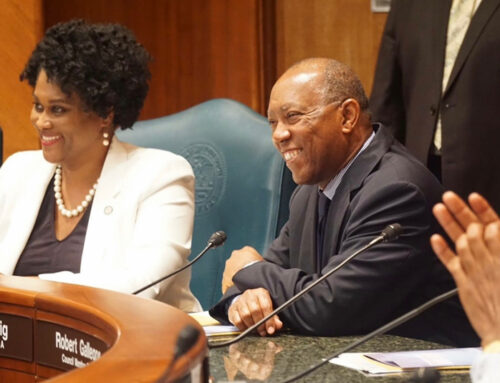

At yesterday’s meeting, city council reviewed nine water bill reforms aimed at resolving issues for residents receiving abnormally high water bills. Current city ordinances limit city staff’s ability to be flexible and provide meaningful commonsense assistance to customers. These reforms will go a long way toward remedying this.
One of the primary issues causing high and often inaccurate water bills is failing water meter reading transmitters. Most homes have transmitters which were installed between 2000 and 2010. With a 10-to-15-year useful life, many of these transmitters are broken. A failing transmitter does not affect your water meter’s ability to accurately measure consumption, but it does affect the ability to accurately transmit consumption information. The city currently has 125,000 failing transmitters. This means we must do manual reads. The city only has the capacity to read 40,000 meters monthly, so the rest are estimated. That’s where we run into problems. The city will soon be contracting with a third-party vendor to assist with manual reads.
The big issue is getting these broken transmitters replaced. The city started this effort in 2019 and so far, 71,000 have been replaced. Replacement efforts were stalled during the pandemic when the chip shortage slowed technology procurement globally.
As supply has caught up, the city is now scheduled to replace 60,000 transmitters each year, on track to fully replace 500,000 transmitters citywide by 2030. Residents with a functioning transmitter may sign up for water usage alerts here. If you are experiencing an unusual bill, wondering if you have a functioning transmitter, or have questions about how to sign up for alerts, please reach out to the Houston Water contact center at [email protected] or (713) 371-1400 between 8:00 am and 7:00 pm Monday through Friday. Please let me know how your customer service experience goes.
The ordinance changes presented yesterday allow for water department staff to provide relief to residents who face high bills for situations out of their control. These changes are as follows:
- Limit on leak adjustment applications: Currently, city ordinance limits residents to two leak adjustments per year when a leak occurs on property. With the changes, residents may apply for relief on their water bill any time they have repaired a leak.
- Bill relief after a leak: Currently, residents receive a 50% adjustment on their bill after proving a repair. To incentivize customers to repair leaks quickly, customers will have 100% of the excess water charges removed if the leak is fixed within 30 days from start of leak, 75% within 60 days, and 50% after 60 days.
- Removing wastewater charges after leaks: Regardless of when the leak is repaired, customers will receive a 100% credit on excess wastewater charges, as most water lost during a leak doesn’t return to the city’s sewer system.
- Remaining balance adjustment after leaks: Customers having a remaining balance after receiving a leak adjustment from the city will qualify for the balance to be reduced to $1,000. Elderly residents who meet eligibility requirements may have their balance reduced to $100. Currently, customers may only have their bill reduced to $2,000 ($250 for seniors).
- Unusually high water bills: Single-family residential customers who receive unusually large water bills, more than 200% of their average water bill, will have their responsibility lowered to 125% of their monthly average water usage if eligible (defined in Chapter 47, Section 75 of the code of ordinances). Currently, customers who qualify for this reduction may only have their bill reduced to 150% of their monthly average.
- Exceptional circumstances adjustment: Commercial, residential, and non-profit customers who receive water bills twice the amount of their average monthly bill due to exceptional circumstances (defined in Chapter 47, Section 75.1 of the code of ordinances) may have their bill reduced by up to $10,000 for one occurrence that does not exceed a two-month timeframe. Currently, customers must have received a bill five times the amount of their monthly average bill to qualify and only receive a maximum $4,000 reduction.
- Water meter locking: Some property owners have meters on their property which are not being used at all but are still accruing base charges. With the reforms, customers will have the option to have their water meter locked for an estimated $150 fee. All base charges will be removed from subsequent water bills. Currently, the only option to remove base water charges is to have the water meter physically removed by a plumber which can cost up to $1,500.
- Paperless billing discount: Customers who opt-in to paperless billing will receive a 50¢ discount on each bill. DO IT! This saves the city and you money! It will also save some trees.
- Limit on back billing estimated bills: When the city estimates a water bill (due to failed transmitter), and that estimate is found to be inaccurate and consumption was underestimated, the city can go back no further than three months to collect additional funds due. If consumption was overestimated by the city, and the error is in the customer’s favor, the city will go back to when the overestimation first occurred to credit the bill. Houston Public Works made these changes earlier this year, and we are now codifying the practice. Previously, back billing occurred for the entire period of estimated water bills.
One council member delayed the vote on these reforms yesterday, but I fully expect them to be enacted next week. Reforms will go into effect immediately upon passage.





